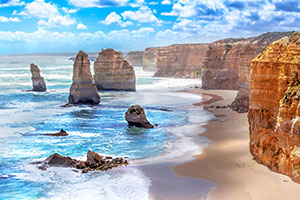10-Nights Outback Safari

10-Nights Outback Safari
Australia
Trafalgar
Vacation Offer ID 1509074
Reference this number when contacting our travel specialist.
Trafalgar
Outback SafariIf the idea of vibrant sunsets, rusty red deserts, jaw-dropping landscapes, and the Tropical North sound like your idea of a perfect adventure, this Outback safari tour is for you. Discovering the Red Centre, connecting with the local Anangu people, and swimming in lush waterfalls are yours for the taking in just 11 days.
Dining Summary
- 10 Breakfast (B)
- 6 Dinner (D)
- Alice Springs: Meet the Falzon family, who have entertained and informed visitors for over 20 years in the outback of Australia, for a Be My Guest Outback Dinner and Show. You will hear stories of ecology, culture and astronomy and learn about the sustainable lifestyle the family has created.
- Alice Springs: Join a local Aboriginal guide to learn about the culture and traditions of the Arrernte People at the Alice Springs Desert Park.
- Kakadu National Park: Get up close to Aboriginal rock art dating some 20,000 years in Kakadu National Park.
- Nitmiluk National Park: Wind through the gorge, carved through ancient sandstone alongside steep cliff walls, watching for lush rainforest gullies in giant cracks, and maybe a freshwater crocodile or two. Learn about the local culture through your indigenous guide’s expertise of the traditional Jawoyn landowners, their stories of how the gorge was formed, and about how the Jawoyn people live and work today.
- Explore Alice Springs Desert Park, the School of the Air, and Nitmiluk National Park with a Local Specialist
- Discover Uluru-Kata Tjuta, Watarrka, and Kakadu National Parks
- Visit historic Telegraph Station, Royal Flying Doctor Service, Mataranka Thermal Springs
- View sunset and sunrise at Uluru, crocodiles and birdlife, and Aboriginal rock art
- See vast cattle properties, and Karlu Karlu (Devils Marbles)
- Scenic Cruise on Nitmiluk (Katherine) Gorge, and Yellow Water Billabong
- Uluru: Discover the stunning heart of the Red Centre at Ayers Rock Resort. Revealing natural beauty of this unique landscape, the accommodation offer incredible views of towering gums, flowering native shrubs and flowing red dunes.
Whats Included
- An expert Travel Director and professional Driver
- Cherry-picked hotels, all tried and trusted
- Porterage where hotels provide this service
- Breakfast daily and up to half of your evening meals
- Must-see sightseeing and surprise extras
- All land transport shown. All transfers shown
- Luxury air-conditioned coach with Wi-Fi in most countries or alternative transportation (such as rail journeys)
- Optional Experiences and free time
Featured Destinations
| Kakadu | Destination Guide |
| Darwin | Destination Guide |
| Katherine | Destination Guide |
| Tennant Creek | |
| Alice Springs | Destination Guide |
| Kings Canyon | |
| Uluru | Destination Guide |
Valid Date Ranges
Trip prices are per person, land only, based on double occupancy and reflect applicable discounts. Trip prices and discounts are subject to change. Airfare is additional. Tour prices, dates and itineraries are correct at the time of the website going live, however are subject to confirmation at the time of booking. Other restrictions may apply.
All fares are quoted in US Dollars.





